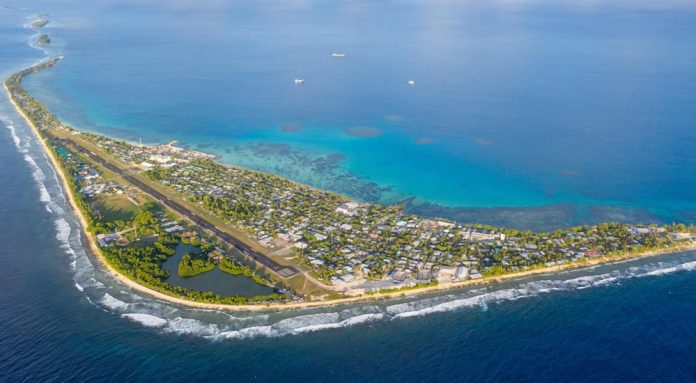By Anna Kelsey-Sugg, Chris Bullock
It’s a question that’s both tragic and hopeful: if a country stops existing physically, can it continue to exist digitally?
Thanks to climate change, this curious question is becoming an essential one – and some countries have already started trying to answer it.
Tuvalu, the tiny Pacific nation of 12,000 people that’s halfway between Australia and Hawaii, is one of them.
UN Secretary-General Antonio Guterres has described the nation as being “on the extreme frontlines of the global climate emergency”.
And in 100 years, it’s likely that Tuvalu will be underwater, according to Karlos Lee Moresi, Tuvalu’s former Secretary of Finance.
So, as well as trying to address the impacts of climate change, Tuvalu is exploring an innovative way to maintain its sovereignty, culture and economy in the face of physical destruction.
Virtual words, blockchain technology and some serious forward thinking all play a part in the plan.
Digitising to help a sinking nation
Two years ago, entrepreneur expert George Siosi Samuels, an Australian citizen who is the son of a Tuvaluan-Samoan mother and Fijian-Indian father, came up with an idea to address Tuvalu’s existential threat.
“I had heard that places like Dubai were literally just building islands out of nothing, because they had the money, and … I was like, well, I’m not a Saudi prince, so let me just have a look at what I could do in case anything dire did actually happen,” he tells ABC RN’s Sunday Extra.
“Tuvaluans, South Pacific Islanders, Polynesians – we’re very culturally oriented. Stories matter a lot. So I thought, why not just start preserving a lot of these stories.”
Samuels’ idea grew to a five-point plan to future-proof Tuvalu, and to use technology to help preserve its economy and its cultural heritage.
In the plan, he suggested improving Tuvalu’s internet infrastructure, making the nation cashless and upgrading the population’s digital skills.
And almost all of the plan comes back to blockchain.
Wait, block what?
You’re not alone if you’re not sure what blockchains are.
Essentially, they’re “quite a boring thing that can be used as databases,” explains Kelsie Nabben, a researcher at RMIT University’s Blockchain Innovation Hub.
But the technology’s potential is more interesting.
Blockchain databases are formed between peer-to-peer networks, which means that no one person or company controls them – rather, a public network does.
Data can’t be changed or removed, so it forms a “timestamp or an immutable, unchangeable record of history”, Nabben says.
Even if one computer is blocked, or goes offline, everyone else still has a copy of the data. And everyone shares it.
Samuels says blockchains could allow Tuvalu to “actually be ahead when it comes to the digitisation of services” and preserving data, as well as assisting “in the cultural preservation of the entire nation”.
He says going cashless would enable the nation to profit from the bitcoin economy, the basis of which is blockchain technology. Additionally, cultural data stored in blockchain would be protected online, collected by and open to the public.
The Tuvaluan government saw merit in the plan. It has taken up some of Samuels’ ideas and included him on its information and communications technology task force.
“One thing I really appreciate about the Tuvalu Government is that they’re not just trying to bring on a new technology because it’s cool or sexy,” Samuels says.
“It’s actually about using the technology in a way that benefits the government [and] its people long-term.”
The real benefits of a virtual world
Another of Samuels recommendations for Tuvalu is generating revenue by investing in property – but not in the way you might imagine.
He suggests Tuvalu create a “digital twin” in the metaverse, the virtual world that’s built on blockchain technology.
He says it could help Tuvalu maintain economic rights around its islands, even if they sink.
South Korea’s capital Seoul already has a digital twin in the metaverse, and is working towards making public services and cultural events available there.
“For Tuvalu, they actually have a more urgent need for something like this,” Samuels argues.
“If [Tuvalu] disappears, but they have a digital twin, could they use their digital property rights as a way of still maintaining sovereignty and legal ownership over the exclusive economic zone for Tuvalu, which is quite large, comparative to their land size?
“This is something I know that they are playing with the idea of … It would be a very interesting legal case.”
Samuels insists his ideas are “not too far-fetched”.
Indeed, Nabben says using blockchain technology to help preserve culture is an idea that is rapidly taking hold.
Closely-cropped photo of woman with blonde hair and black sleeveless shift smiles slightly.
That includes in Australia, where a team including artists, researchers and lawyers are working towards First Nations cultural preservation in the metaverse.
“Virtual worlds will increasingly become a part of the ‘land on which we meet’ [and] First Nations Peoples need a seat at the metaverse table,” the paper states.
Addressing – or creating – climate concerns?
There have been widespread criticisms about the environmental impact of blockchain technologies such as bitcoin.
That’s because the way the technology has worked historically is by using “a lot of electricity to run computers 24-7”, Nabben explains.
It started as something individuals could do from home and today there are data warehouses running the technology at commercial scale.
In 2021, the University of Cambridge’s Centre for Alternative Finance estimated the annual consumption of electricity by the bitcoin network as being more than countries such as Sweden, Pakistan and Malaysia, and about 61 percent of Australia’s total energy consumption.
But Nabben argues that blockchain is not the source of the environmental problem.
“Really, people should be talking about these broader trends of digitisation,” she says.
“Massive amounts of computing energy, which means electricity, are used for many digital processes. This includes AI, machine-learning algorithms, and all these kind of directions that we’re going around technology and society.
“Blockchain is just one sliver of that.”
In fact, Nabben believes the technology can be used to address environmental issues.
“One interesting thing about blockchain is that it’s a coordination technology. So it helps people to do things in this peer-to-peer way,” she says.
“So I wonder if, in such a well-resourced area, where people are being extremely innovative and self-organising, that might actually lead to people wanting to address climate concerns – and doing that through this technology.”
‘Technology doesn’t solve social problems’
Samuels concedes that much of what he proposes for the future of Tuvalu is “worst-case scenario planning”
He also acknowledges that there are other pressing issues that need addressing – a point Nabben echoes.
She says “technology doesn’t solve social problems”, such as the repatriation of people displaced by climate change, meeting basic needs and helping people “learn languages for wherever they end up”.
But Samuels says that in planning for the role of digitisation in an “in-case of” scenario, he hopes momentum and support can be generated to have changes “take place sooner rather than later”.
After all, he says, climate change has taught us “what happens when we leave things too late” .
SOURCE: ABC/PACNEWS


















